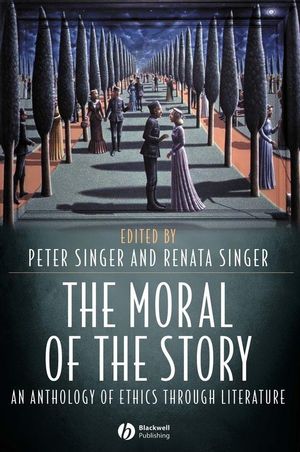|
Textbook
The Moral of the Story: An Anthology of Ethics Through LiteratureISBN: 978-1-4051-0584-2
Paperback
640 pages
February 2005, ©2005, Wiley-Blackwell
 This is a Print-on-Demand title. It will be printed specifically to fill your order. Please allow an additional 10-15 days delivery time. The book is not returnable.
|
||||||
I. Who Am I?.
Ralph Ellison, from Invisible Man.
Kathy Lette and Gabrielle Carey, from Puberty Blues.
James Baldwin, from Giovanni’s Room.
Arthur Miller, from The Crucible.
George Eliot, from Middlemarch.
Tom Wolfe, from Bonfire of the Vanities.
William Shakespeare, from Macbeth.
II. Duties to Kin.
A. The Duties of Parents to their Children.
8. Charlotte Perkins Gilman, “The Unnatural Mother”.
9. Charles Dickens, from Bleak House.
10. Joseph Kanon, from The Good German.
B. The Duties of Sisters and Brothers.
11. Sophocles, from Antigone.
12. William Shakespeare, from Measure for Measure.
C. The Duties of Children to their Parents.
13. Zitkala-Ša, “The Soft-hearted Sioux”.
14. Ambrose Bierce, “A Horseman in the Sky”.
15. Alice Munro, from “The Peace of Utrecht”.
III. Love, Marriage and Sex.
16. Jane Austen, from Pride and Prejudice.
17. William Shakespeare, from Romeo and Juliet.
18. Vikram Seth, from A Suitable Boy.
19. Guy De Maupassant, “The Model”.
20. Leo Tolstoy, from Anna Karenina.
21. George Eliot, from Middlemarch.
22. Daniel Defoe, from Moll Flanders.
23. John Cleland, from Memoirs of a Woman of Pleasure.
24. George Bernard Shaw, from Mrs Warren’s Profession.
IV. Abortion, Euthanasia and Suicide.
25. Maeve Binchy, from “Shepherd’s Bush”.
26. Brian Clark, from Whose Life is it Anyway?.
27. Kate Jennings, from Moral Hazard.
28. William Shakespeare, from Hamlet, Prince of Denmark.
29. Arna Bontemps, “A Summer Tragedy”.
PART TWO: THE COMMUNITY AND BEYOND.
V. Work Ethics.
30. Elizabeth Gaskell, from North and South.
31. Edwin Seaver, from The Company.
32. Ruth Ozeki, from My Year of Meats.
33. Henrik Ibsen, from An Enemy of the People.
34. C.P. Snow, from The Search.
VI. What Do We Owe to Our Country, Compatriots and Strangers.
35. Euripedes, from Iphigeneia at Aulis.
36. Geraldine Brooks, from Year of Wonders.
37. Ian McEwan, from Enduring Love.
38. Nick Hornby, from How to be Good.
39. Joyce Carol Oates, “The Undesirable Table”.
VII. Ethics and Politics.
40. Anthony Trollope, from Can You Forgive Her.
Anonymous (Joe Klein), from Primary Colors.
Anthony Trollope, from Phineas Finn.
VIII. Racism and Sexism.
43. Harriet Beecher Stowe, from Uncle Tom’s Cabin.
44. Lerone Bennett Jr., “The Convert”.
45. William Shakespeare, from The Taming of the Shrew.
46. Henryk Ibsen, from The Doll's House.
IX. War.
47. Leo Tolstoy, from War and Peace.
48. Pat Barker, from Regeneration.
49. Wilfred Owen, “S.I.W.”.
50. William Shakespeare, from King Henry V (Act 3 .Scene 3).
51.William Shakespeare, from King Henry V (Act 4, Scene 1).
52. Alfred Lord Tennyson, “The Charge of the Light Brigade”.
53. S.Yizhar, from “The Prisoner”.
54. John Fowles, from The Magus.
X. Animals and the Environment.
55. Desmond Stewart, “The Limits of Trooghaft”.
56. Richard Adams, from The Plague Dogs.
57. Douglas Adams, from Restaurant at the End of the Universe.
58. James Fenimore Cooper, from The Pioneers.
XI. Duties to God.
59. Aeschylus, from Prometheus Bound.
60. Genesis 22, from The Holy Bible.
61. Fyodor Dostoyevsky, from The Brothers Karamazov.
XII. New Life Forms.
62. Mary Shelley, from Frankenstein.
63. Karel Capek, from The Makropulos Secret.
PART THREE: REFLECTING ON ETHICS.
XIII. The Nature of Ethics.
64. E. Pauline Johnson, “The Sea Serpent”.
65. Daniel Defoe, from Robinson Crusoe [pp194-199].
66. Mark Twain, from The Adventures of Huckleberry Finn.
67. Graham Greene, from The Third Man.
68. Tadeusz Borowski, “This Way For The Gas, Ladies and Gentelemen”.
XIV. Rules, Rights, Duties and The Greater Good.
69. Ursula Le Guin, “The Ones Who Walk Away From Omelas”.
70. Fyodor Dostoyevsky, from Crime and Punishment.
71. Kazuo Ishiguro, from The Remains of the Day.
72. Anthony Trollope, from Dr Wortle’s School.
73. George Eliot, from Middlemarch.
74. Harper Lee, from To Kill a Mockingbird.
75. William Shakespeare, “Sonnet 138” [“When my love swears that she is made of truth”?].
XV. Ultimate Values.
76. Daniel Defoe, from Robinson Crusoe [pp148-149].
77. Henry James, from The Portrait of a Lady.
78. Aldous Huxley, from Brave New World.
79. Henry James, from The Princess Casamassima.
Index



